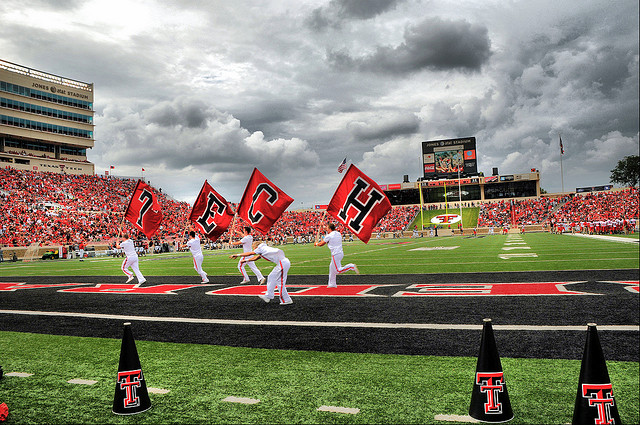Five things you need to know: Texas Tech
This Saturday, Kansas will take on its toughest challenger thus far as the Red Raiders will make the journey to Lawrence to take on the Jayawks. Before the game kicks off, here are five things you need to know about Texas Tech…
1. Texas Tech’s passing game is no joke
408.5 yards per game. That is the current average for the Texas Tech passing offense, good enough for third in the country. The Red Raiders have scored 12 of their 17 offensive touchdowns through the air and have had seven different receivers record a touchdown catch. Texas Tech is not afraid to go deep, as nine of their receivers have already recorded a 30+ yard catch and six of said receivers have recorded a 45+ yard catch. Tech will spread the ball around to players such as Bradley Marquez, who is leading the Red Raiders with four receiving touchdowns and Jace Amaro, who is leading the team in both receptions (29) and yards (367).
While Baker Mayfield has been the primary starter for Tech, David Webb saw a majority of the playing time last time out, as he connected on two touchdowns in a lopsided victory against Texas State. Who Tech will rely on at quarterback remains to be seen, especially if the game is close, but the Jayhawks absolutely must use the Raiders’ quarterback uncertainty to their advantage. The Jayhawks must get to the quarterback(s) early and often if they want to have a chance in Saturday’s game.
One additional thing to note: Michael Brewer could also step in to play quarterback for Texas Tech, as he has been progressively recovering from a back injury. One of the biggest questions for Kansas going in to this game will be how to prepare for a possibility of facing three different quarterbacks.
2. Texas Tech boasts one of the nation’s top defenses
This year Texas Tech has held opponents to a mere 13.3 points per game, which ranks tenth in the nation. Tech has picked off four passes on the season, and if Jake Heaps isn’t careful, that number could easily double in size. Texas Tech has the kind of defense that can absolutely tear a team apart so Weis will need to have the Jayhawks well prepared as they take on the undefeated Red Raiders.
One of the more scary parts about Texas Tech’s defensive statistics is the fact that Tech has actually played fairly decent competition. Rather than facing four schools that have no business being on the field with them, Tech has already faced SMU and a ranked Texas Christian University. The other two teams they have faced are SF Austin and Texas State (currently 3-1 and in third in the Sun Belt Conference).
The Jayhawks have struggled to put up points the last few weeks, and haven’t broken the fifteen-point barrier since their week one win against South Dakota. The Jayhawks will have to perform offensively at a much higher rate than their current average of just 19.3 points per game (105th in the nation) if they are going to even have a chance, but Texas Tech isn’t the type of team that will let them get on track as the game goes along. Kansas will need to find some way to score early if they will pull off the improbable upset. Special teams will be vital for Kansas as winning the field position battle will be an absolute necessity.
3. Texas Tech’s run game is a three-headed monster
If Texas Tech does have a weakness, it has to be in their ability to run the ball; the Red Raiders aren’t even in the top 100 in rushing yards per game. However, this doesn’t mean that they are without capable running backs. Much like the Jayhawks, the Red Raiders tend to split carries between a few different running backs. Baker Mayfield (who began as the primary quarterback for Tech) is currently leading the team with 39 carries but DeAndre Washington and Kenny Williams have been impressive as well.
Washington is a 5’8″ sophomore from Missouri City, Texas and so far he has struggled to get in to a rhythm this season. Washington has rushed for 103 yards on 30 carries, and has only scored one touchdown. Kenny Williams, on the other hand, is just one inch taller than Washington, but he does outweigh him by 40 pounds. Williams has racked up three total touchdowns on the season, two of which have come on the ground. However, like Washington, Williams has struggled to find any consistency rushing, especially on the road where he averages just 0.8 yards per carry. In fact, Texas Tech as a team only averages 48 yards per game on the road, and on a mere 1.78 yards per carry. If Kansas allows the Texas Tech run game to get going, then this game could turn into a blowout, quickly.
4. History will likely repeat itself
The Jayhawks’ history against the Red Raiders has been almost entirely one sided. Kansas is an all time 1-13 against Texas Tech, with 10 of the 13 losses coming by double digits, and two of the last four losses coming by 20 or more points. The Jayhawks’ lone win against Tech came in 2001, when the Jayhawks stunned the Raiders in double overtime, 34-31. KU will be looking to pull off the upset of the season when they take on Texas Tech, but it isn’t completely out of the realm of possibility. This NCAA season has featured numerous upsets, from Kansas State losing to North Dakota State, to Towson going on the road and shocking the University of Connecticut, a team that would then go on to lose by just three to a 15th ranked Michigan squad. While it seems unlikely that Kansas will hang around, there certainly is a chance.
5. Consistency, consistency, consistency
Ryan Bustin, kicker for the Red Raiders, is the Drew Brees of college kickers. Bustin has made an impressive 90% of his field goal attempts and has yet to miss from less than forty yards, but the most brilliant example of his accuracy is his proficiency in converting PATs. Not only is Bustin 18-for-18 on extra points this year, for his career he is a monstrous 77-for-77. To put that number in to reference, Mason Crosby, one of the greatest college kickers of all time, never made 77 consecutive PATs, and in fact missed eight of his first 77 attempts while at the University of Colorado.
Let’s say the average college kicker makes PATs at a rate of 95% (although that number is clearly higher than the true average); the odds of that kicker making seventy-seven straight would be just a hair over 1.926%. To take it a step farther, the odds of being struck by lightning are approximately one in 500,000, which calculates to .0002%. Now lets take Steve Smith, one of the greatest free throw shooters in NBA history, with a career success rate of 84.52 %. The odds of an 84.52% free throw shooter making 77 straight shots from the charity stripe is approximately (you guessed it) .0002%, or one in 500,000. In fact, Mark Price (who is tied with Steve Nash as the greatest NBA free throw shooter of all time) only made 77 straight in his career one time, and, if you were wondering, he missed number 78. Hopefully, we won’t get the chance to see if Bustin will continue his streak this Saturday. However, it is likely that he will be given the opportunity to push his streak to 80, or even higher.
Overall, I expect that Kansas will struggle against a well rounded Texas Tech side, but with the uncertainty at the quarterback position for the Raiders, and lack of any road run presence, Tech is certainly very vulnerable and very beatable.





Way cool! Some extremely valid points! I appreciate you
writing this post and the rest of the website is also very
good.
Feel free to visit my web page … ベーシック&クラシック系
Pingback: シーマスター プラネットオーシャンサイト
Pingback: ヘルメット フルフェイスヘルメットサイト
tadalafil brand name – discount canadian cialis generic cialis cheapest price
cheap erectile dysfunction – over the counter ed pills that work erection pills that work
deltasone without script online in mexico – order prednisone without prescription prednisone oral
generic viagra online canadian pharmacy – price of 100mg viagra 415 viagra 4
best online foreign pharmacy – Cialis now cost tadalafil generic
ivermectin cost uk – ivermectin online price of ivermectin liquid
buy albuterol online – ventolin nebules ventolin tablet price
cytotec buy online usa – cytotec tablets australia cytotec capsule
doxycycline gel in india – how much is doxycycline in south africa doxycycline cap tab 100mg
canada neurontin 100mg discount – gnneurontin.com levothyroxine order
viagra prescription medicine – cheap generic viagra fast delivery
how to get cialis online – cialis price uk generic tadalafil 20mg for sale
vardenafil cena – generic for vardenafil generic vardenafil canada
stromectol for sale online – ivermectine stromectol 15 mg
prednisone 20 mg tablets – deltasone 50 mg prednisone 20mg
accutane medication – accutane medicine buy cheap accutane
buy amoxicilina 500 mg online – amoxicillin where to buy amoxicilin
medrol 40 mg – lyrica online pharmacy order lyrica online
help with term papers – term paper writers paper help
usa viagra – Pfizer viagra 50 mg online sildenafil 200mg
tadalafil from india 5mg – Buy cialis low price buy generic tadalafil uk
buy ivermectin tablets – stromectol oral stromectol tab
400 mg prednisone – prednisone no script prednisone 1.25 mg
lasix brand name cost – medicine furosemide 20 mg lasix 40 mg for sale
ventolin price canada – Albuterol online generic ventolin price
online buy cytotec – cytotexr buy cytotec india
doxycycline pills price in south africa – prednisolone over the counter uk prednisolone 5mg tablets buy
stromectol oral – ivermectin without prescription order stromectol
ivermectin price canada – stromectol tab 3mg ivermectin cream 1%
cheapest sildenafil online – sildenafil coupon sildenafil for sale
prednisone no script
buying tadalafil online safely – buy tadalafil pills tadalafil reviews
where to buy accutane uk – accutane 20 mg roche accutane
can you buy stromectol over the counter – stromectole cost ivermectin
order viagra in india – Cialis non prescription tadalafil soft 40mg
generic vardenafil 100mg – best canadian pharmacy for viagra erectile dysfunction treatment options
vardenafil dosage – levitra generic ed cures that actually work
hydroxychloroquine sulfate over the counter – plaquenil cost of 10 mg prednisone
cenforce 200 usa and uk – cenforcep buy vidalista 20 mg online 20%off
orlistat 60mg capsules – orlistat mice xenical generic name
ivermectin ebay – ivermectin brand name stromectol uk buy
viagra 6 pills – sildenafil viagra buy generic viagra 100mg online
generic cialis black – 150 mg cialis safe cialis online
can you buy prednisone over the counter uk – prednisone 20mg dosage prednisone prescription
buy cialis over the counter uk – best price for cialis 10mg cialis
ivermectin 90 mg – generic name for ivermectin ivermectin lotion cost
ivermectin dose for covid – ivermectin usa ivermectin 3mg dose
where can i get female viagra uk – cheap viagra soft pill generic prescription viagra
viagra costa rica – viagra next day generic viagra price uk
cialis 5mg price – cialis coupons overseas online pharmacy
cialis tadalafil 10mg – Cialis free samples tadalafil over the counter usa
ivermectin 0.5 lotion – ivermectin otc stromectol 3mg cost
ivermectin 1 cream – fda ivermectin ivermectin eye drops
pala casino online – casirealgam gambling casino online
I am extremely inspired with your writing abilities and also with the layout for your weblog.
Is this a paid subject or did you modify it your self?
Anyway stay up the nice high quality writing, it is uncommon to
see a great blog like this one nowadays..
This is a topic that’s close to my heart…
Thank you! Where are your contact details though?
What’s up everybody, here every one is sharing such familiarity, so it’s
nice to read this website, and I used to pay a quick visit this blog everyday.
hey there and thank you for your information – I’ve definitely picked up something new
from right here. I did however expertise some technical issues using this
web site, since I experienced to reload the website lots of times previous
to I could get it to load correctly. I had been wondering if your web hosting is OK?
Not that I am complaining, but sluggish loading instances times will often affect
your placement in google and could damage your high-quality score if ads and marketing with Adwords.
Well I am adding this RSS to my email and can look out
for a lot more of your respective exciting content.
Make sure you update this again soon.
Hello it’s me, I am also visiting this web page on a regular basis, this web site is actually fastidious and
the people are genuinely sharing pleasant thoughts.
I’ve been browsing online more than 4 hours today, yet
I never found any interesting article like yours.
It is pretty worth enough for me. In my opinion, if all website owners and bloggers made good content as you did, the internet will be much
more useful than ever before. By the way, here is a
link to great site for earnings – https://casino-realmoney.com/casino-heroes/
I know this if off topic but I’m looking into starting my own weblog and was wondering what all is needed to get set up?
I’m assuming having a blog like yours would cost a pretty penny?
I’m not very internet savvy so I’m not 100% sure. Any suggestions or
advice would be greatly appreciated. Thanks
academia writing – write college essays for money assignments for sale
sildenafil india pharmacy – Sale viagra sildenafil soft gel capsule
stromectol buy – ivermectin 6mg tablets stromectol canada
prednisone 20mg for sale – cost of prednisone prednisone without rx
price of accutane in mexico – accutafte accutane cream
amoxicillin rash – buy amoxicilina 500 mg amoxicillin 500 mg for sale
buy ivermectin 6mg for humans – ivermectin 3 mg for humans for sale ivermectin buy canada
free slots online – casinos real money casino games
ivermectin pills canada – ivermectin over counter stromectola online
buying viagra online viagra mg
generic cialis images cialis 20 mg
canadian pharmacy no prescription needed – legit canadian pharmacy online cialis canadian pharmacy
buy erectile dysfunction pills – best ed medication buying ed pills online
walmart pharmacy rx plans apply to cvs pharmacy online
generic prednisone – cheap prednisone online buy prednisone 20mg online
buy prednisone over the counter – steroid prednisone prednisone over counter
canadian drugs online pharmacy tech jobs
ivermectin for chickens egg withdrawal what is ivermectin for
ivermectin dose for scabies in humans ivermectin for ferrets
accutane cream online – isotretinoin generic accutane prescription discount
amoxicillin brand over the counter – buy amoxicillin 500mg canada purchase amoxicillin 500mg online
online casino – online slots slots real money
ivermectin nobel prize dog wormer ivermectin
maximpeptide tadalafil review tadalafil pulmonary arterial hypertension
online medical stores sell tadalafil without medical prescription in india buy tadalafil uk
cialis comparison buy liquid cialis online
ivermectin lotion cost – ivermectin uk coronavirus ivermectin 1 cream generic